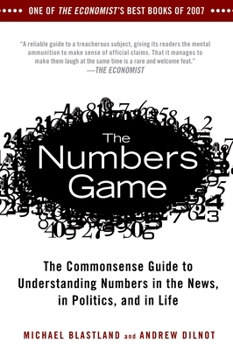The Numbers Game: The Commonsense Guide to Understanding Numbers in the News, in Politics, and in L ife
Select Format
Select Condition 
Book Overview
The Strunk and White of statistics team up to help the average person navigate the numbers in the news Drawing on their hugely popular BBC Radio 4 show More or Less, journalist Michael Blastland and internationally known economist Andrew Dilnot delight, amuse, and convert American mathphobes by showing how our everyday experiences make sense of numbers. The radical premise of The Numbers Game is to show how much we...
Format:Paperback
Language:English
ISBN:1592404855
ISBN13:9781592404858
Release Date:January 2010
Publisher:Penguin Publishing Group
Length:224 Pages
Weight:0.45 lbs.
Dimensions:0.6" x 5.3" x 8.0"
Age Range:18 years and up
Grade Range:Postsecondary and higher
Customer Reviews
4 ratings
Superb book on what Numbers really mean...definitely a steal at this low price too!
Published by Thriftbooks.com User , 14 years ago
This book is fantastic; Michael Blastland and Andrew Dilnot have really captured the essence of what Numbers are all about. Here are three of my favorite quotes from the book: "Uncertainty is a fact of life. Numbers, often being precise, are sometimes used as if they overcame it. A vital principle to establish is that many numbers will be uncertain, and we should not hold that against them. Even 90 percent accuracy might imply more uncertainty than you would expect. The human lesson here is that since life not certain, and since we know this from experience, we should not expect numbers to be any different. They can clarify uncertainty, if used carefully, but they cannot bet it." "Being fallible does not make numbers useless, and the fact that most of the positives are false positives does not mean the test is no good. It has at least narrowed the odds, even if with nothing like 90 percent certainty. Those who are positive are still unlikely to have breast cancer, but they are a little more likely than before they were tested. Those who are negative are now even less likely to have it than before they were tested. So it is not that uncertainty means absolute ignorance, nor that the numbers offer certainty, rather that they can narrow the scope of our ignorance." "We accuse statisticians of being overly reductive and turning the world into numbers, but statisticians know well enough how approximate and fallible their numbers are. It is the rest of us who perform the worst reductionism whenever we pretend the numbers give us excessive certainty. Any journalist who acts as if the range of uncertainty does not matter, and reports only one number in place of a spread of doubt, conspires in a foolish delusion for which no self-respecting statistician would ever fall." I hope these quotes connote a general flavor of the skepticism that Blastland and Dilnot are conveying. I found the book terrific and think everyone should read it. I would also recommend reading the books On Being Certain: Believing You Are Right Even When You're Not and Your Brain Is (Almost) Perfect: How We Make Decisions. They fall within this same general category and are equally as good.
A Landmark Book on Numeracy
Published by Thriftbooks.com User , 15 years ago
"The Numbers Game" addresses a popular and well-worn topic -- that of how to understand and use the multitude of numbers that permeate modern life. Many popular/"pop science" books purport to cover this topic in illuminating and helpful ways. Of all these publications, I strongly recommend "The Numbers Game" first and foremost -- there is a reason this book was one of the Economist's "Best Books of 2007" and is now used to train all BBC journalists. No other modern publication comes close to both (a) highlighting the importance of understanding how numbers are used in nearly all facets of everyday life and (b) illustrating how to best understand and use numbers to your advantage in the manner Michael Blastland and Andrew Dilnot do in this essential publication. It is rare to find a book that is so accessible to such a wide audience, yet offers such powerful, useful, and immediately applicable tools for understanding our world. Numbers permeate our lives in many ways, yet the application of statistics and numbers in general is poorly understood and can have tremendous influence on the way in which the world is viewed. I offer my this book my strongest recommendation to all readers. Its lessons are timeless and increasingly important in our data- and information-laden societies and its presentation is widely accessible. Readers stand to benefit in real and immediate ways after taking the time to understand the messages in this book. One of the striking "take aways" from "The Numbers Game" is the perspective it opens up for readers. It offers a powerful way to look at, and question, data and information. Put another way, this book opens a panorama for how to assess, interpret, and question data and information -- arguably a more important gift to readers than presenting facts and answers.
Best of the lot
Published by Thriftbooks.com User , 15 years ago
This is the most comprehensive and best of the generally available non-technical books on this subject. Well written with numerous examples (many of them from Britain) . Len Meiselman.
Delightful, well done
Published by Thriftbooks.com User , 15 years ago
The authors have done us all a great favor - they've written a book that will help make media consumers less credulous. In the current news climate, making sense of numbers is more important than ever. It is an enjoyable read as well.





